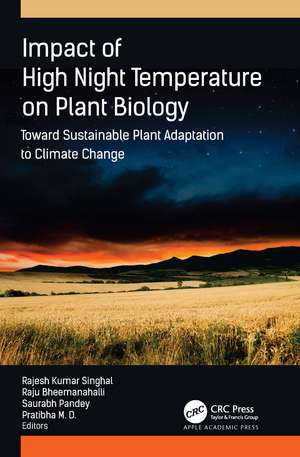Impact of High Night Temperature on Plant Biology: Toward Sustainable Plant Adaptation to Climate Change
Editat de Rajesh Kumar Singhal, Raju Bheemanahalli, Saurabh Pandey, M.D. Pratibhaen Limba Engleză Hardback – 6 dec 2024
Preț: 1110.14 lei
Preț vechi: 1353.84 lei
-18% Nou
Puncte Express: 1665
Preț estimativ în valută:
212.45€ • 230.69$ • 178.46£
212.45€ • 230.69$ • 178.46£
Carte tipărită la comandă
Livrare economică 22 aprilie-06 mai
Preluare comenzi: 021 569.72.76
Specificații
ISBN-13: 9781774917336
ISBN-10: 1774917335
Pagini: 234
Ilustrații: 40
Dimensiuni: 152 x 229 mm
Greutate: 0.48 kg
Ediția:1
Editura: Apple Academic Press Inc.
Colecția Apple Academic Press
ISBN-10: 1774917335
Pagini: 234
Ilustrații: 40
Dimensiuni: 152 x 229 mm
Greutate: 0.48 kg
Ediția:1
Editura: Apple Academic Press Inc.
Colecția Apple Academic Press
Public țintă
Academic and PostgraduateCuprins
Introduction PART I: NIGHT-TIME WARMING: AN INTRODUCTION 1. Natural and Anthropogenic Factors Responsible for Night-Time Warming 2. Elevated CO2 and Night Warming for Plant Growth and Development 3. Plant Growth and Development Under High Night Temperatures PART II: NIGHT WARMING EFFECT ON CRUCIAL PROCESSES AND METABOLISM 4. Night Warming Responses on Crucial Plant Processes and Growth Stages: An Overview 5. Effect of Elevated Night Temperature on Nutrient Cycle, Nutrient Uptake, and Transport 6. Effect of Elevated Night Temperature on Metabolism (Respiration) 7. High-Temperature Stress: Effects on Plant Metabolism Specific to Lipidome PART III: REPRODUCTIVE GROWTH AND NIGHT WARMING 8. Effect of Night-Time Warming on Reproductive Growth of Plants 9. Effect of Night-Time Warming on Yield and Quality Attributes PART IV: PLANT GROWTH REGULATORS AND OMICS UNDER NIGHT WARMING 10. The Role of Plant Growth Regulators in Combating High Night Temperature Stress 11. Omics Under Elevated Night Temperature
Recenzii
“A comprehensive overview . . . provides valuable insights into the impact of high night temperatures on plant sciences and the measures that can be taken to improve plant adaptation and resilience. . . . Bring[s] a wealth of expertise and knowledge to the subject matter and provides a deeper understanding of the natural and anthropogenic factors responsible for it.”
—From the Foreword by Raju Bheemanahalli, PhD, Department of Plant and Soil Sciences, Mississippi State University, USA
—From the Foreword by Raju Bheemanahalli, PhD, Department of Plant and Soil Sciences, Mississippi State University, USA
Notă biografică
Rajesh Kumar Singhal, PhD, is a Scientist in the Division of Crop Improvement of the ICAR-Indian Grassland and Fodder Research Institute, Jhansi (U.P), India. He has published research and review papers and book chapters as well as an MCQ book, A Quick Approach to Plant Physiology, Biochemistry and Biotechnology.
Raju Bheemanahalli, PhD, is an Assistant Research Professor of Plant and Soil Sciences at Mississippi State University, USA. He leads multidisciplinary research on how crops respond to stressors (drought, heat, cold, nutrients, and others) at different growth stages. His work has resulted in improved basic and applied knowledge of monocot and dicot crops in response to stressors and management. Affiliated with several journals, he has published peer-reviewed journal articles.
Saurabh Pandey, PhD, is an Assistant Professor of Agriculture at Guru Nanak Dev University, Amritsar, Punjab, India. He is currently working on biotic stress management of unconventional crops, like banana and apple, in the Punjab region for screening and analysis of banana germplasms for banana bunchy top virus (BBTV) tolerance and establishing screening methods and biomarkers for microbiological resources toward improved crop phosphorus (P) uptake under highly P-deficient soils.
Pratibha M. D., PhD, is a Scientist in the Division of Basic Sciences at the ICAR-Indian Institute of Horticultural Research, Bengaluru, Karnataka, India. Currently, she is working on identifying molecular mechanisms conferring combinatorial stress tolerance in brinjal (eggplant). She has also worked at Monsanto Holding Pvt. Ltd. as a vegetable backcross breeder, contributing to the development of more than 15 hybrids in tomato and hot pepper.
Raju Bheemanahalli, PhD, is an Assistant Research Professor of Plant and Soil Sciences at Mississippi State University, USA. He leads multidisciplinary research on how crops respond to stressors (drought, heat, cold, nutrients, and others) at different growth stages. His work has resulted in improved basic and applied knowledge of monocot and dicot crops in response to stressors and management. Affiliated with several journals, he has published peer-reviewed journal articles.
Saurabh Pandey, PhD, is an Assistant Professor of Agriculture at Guru Nanak Dev University, Amritsar, Punjab, India. He is currently working on biotic stress management of unconventional crops, like banana and apple, in the Punjab region for screening and analysis of banana germplasms for banana bunchy top virus (BBTV) tolerance and establishing screening methods and biomarkers for microbiological resources toward improved crop phosphorus (P) uptake under highly P-deficient soils.
Pratibha M. D., PhD, is a Scientist in the Division of Basic Sciences at the ICAR-Indian Institute of Horticultural Research, Bengaluru, Karnataka, India. Currently, she is working on identifying molecular mechanisms conferring combinatorial stress tolerance in brinjal (eggplant). She has also worked at Monsanto Holding Pvt. Ltd. as a vegetable backcross breeder, contributing to the development of more than 15 hybrids in tomato and hot pepper.
Descriere
Comprehensively covers the physiology of night-time warming, trait responses, advanced tools for phenotyping, and alleviation and mitigation strategies. Discusses HNT in detail and its effect on plant growth and development. Covers impact of HNT on plant metabolism and crucial plant processes with reproductive stage effects.
